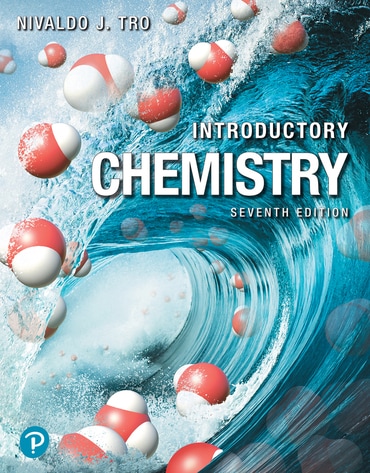
Introductory Chemistry, 7th edition
Title overview
For 1-semester courses in preparatory chemistry.
Actively engage students to succeed in the course and beyond
Introductory Chemistry shows how chemistry manifests in students' daily lives. Award-winning instructor and author Nivaldo Tro draws on his classroom experience to engage students, capture their attention with relevant applications and extend chemistry to their world.
The 7th Edition delivers new Self-Assessment Quizzes, Predict This! feature, and additional End-of-Chapter questions, while expanded active learning tools support students in developing problem-solving skills. An extensive diversity, equity and inclusion review ensures the content reflects the experiences of all students.
Hallmark features of this title
- 4-step process (Sort, Strategize, Solve and Check) helps students learn how to develop a problem-solving approach.
- 2 & 3 column worked examples break down problem-solving steps: the 1st column outlines the problem-solving procedure and reasoning of each step; the 2nd and 3rd columns show how to implement the steps with examples.
- The Solution map provides a visual aid that helps students navigate problems.
- For More Practice in each worked Example directs students to opportunities to practice skills from the Example.
- Multipart images depicted through Macroscopic, Microscopic and Symbolic perspectives help students better visualize and understand chemistry.
- Molecular-level views reveal connections between everyday processes and the activities of atoms and molecules.
New and updated features of this title
- Self-Assessment Quizzes help students check their understanding of the material in the chapter and better prepare for exams. Quizzes are located at the end of each chapter.
- Predict This! asks students to predict the outcome of the topic they are about to read. After the student reads the section, Predict Follow-up confirms whether the student predicted correctly or incorrectly and why.
- End-of-Chapter questions have been added throughout the book, and numerous End-of-Chapter questions have been revised. Many new End-of-Chapter questions involve the interpretation of graphs and data.
- Diversity, equity and inclusion review ensures the content reflects the diversity, depth, and breadth of all learners' lived experiences.
Key features
Features of Mastering Chemistry for the 7th Edition
- NEW: 15 Key Concept Interactives are digital self-checks that guide students through key topics in order to learn key concepts. Students navigate a series of interactive screens with questions they must answer to progress. Questions provide wrong-answer feedback.
- NEW & EXPANDED: 45 Key Concept Videos (33 new) feature Tro explaining a key chapter concept through text art with 2D and 3D animations, and 78 Interactive Worked Examples (39 new) help students apply the Sort, Strategize, Solve, and Check problem-solving technique.
- NEW & UPDATED: New End-of-Chapter questions have been added and numerous End-of-Chapter questions have been revised. Many new questions involve the interpretation of graphs and data, and all can be assigned in Mastering Chemistry.
- NEW: Freehand Grader (beta) provides an effective way to quickly grade any type of problem and handwritten solution. Authentically assess students and provide meaningful feedback, using the grade-as-you go rubric.
- Missed This? feature directs students to the section, Key Concept Video or Interactive Worked Example that covers the content needed to solve the problem they missed.
- Conceptual Check Points and Self-Assessment Quizzes allow students to practice the types of questions they will encounter on the ACS or other exams.
Features of Pearson eTextbook for the 7th Edition
- NEW: 15 Key Concept Interactives in the eTextbook break down key topics and guide students through an interactive experience with opportunities for practice. Questions provide wrong-answer feedback.
- NEW & EXPANDED: 45 Key Concept Videos (33 new) feature Tro explaining a key chapter concept through text art with 2D and 3D animations, and 78 Interactive Worked Examples (39 new) guide students in applying the Sort, Strategize, Solve and Check problem-solving technique.
- UPDATED: Conceptual Connections now allow students to answer the question in the eTextbook and receive feedback written by author Niva Tro. Conceptual Check Points and Self-Assessment Quizzes enable students to interact with all conceptual connection and self-assessment quizzes.
- NEW: Predict This! asks students to predict the outcome of the topic they are about to read. Predict Follow-up confirms whether the student predicted correctly or incorrectly and why.
- For More Practice problems provide wrong-answer feedback with links that direct students to correlating content in the eTextbook.
- Missed This? directs students to the text section, Key Concept Videos and Interactive Worked Examples that cover the content required to solve the problem they just missed.
Table of contents
- The Chemical World
- Measurement and Problem Solving
- Matter and Energy
- Atoms and Elements
- Molecules and Compounds
- Chemical Composition
- Chemical Reactions
- Quantities in Chemical Reactions
- Electrons in Atoms and the Periodic Table
- Chemical Bonding
- Gases
- Liquids, Solids, and Intermolecular Forces
- Solutions
- Acids and Bases
- Chemical Equilibrium
- Oxidation and Reduction
- Radioactivity and Nuclear Chemistry
- Organic Chemistry
- Biochemistry
Author bios
About our author
Nivaldo Tro has been teaching college chemistry since 1990 and is currently teaching at Santa Barbara City College. He received his Ph.D. in chemistry from Stanford University for work on developing and using optical techniques to study the adsorption and desorption of molecules to and from surfaces in ultrahigh vacuum. He then went on to the University of California at Berkeley, where he did postdoctoral research on ultrafast reaction dynamics in solution. Professor Tro has been awarded grants from the American Chemical Society Petroleum Research Fund, from the Research Corporation, and from the National Science Foundation to study the dynamics of various processes occurring in thin adlayer films adsorbed on dielectric surfaces. Professor Tro lives in Santa Barbara with his wife, Ann. In his leisure time, Professor Tro enjoys cycling, surfing, and being outdoors.